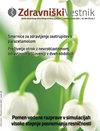Enhanced recovery after surgery in patients with colorectal cancer in Slovenia 2012
Q4 Medicine
Zdravniski Vestnik-Slovenian Medical Journal
Pub Date : 2014-03-01
DOI:10.6016/SLOVMEDJOUR.V83I2.1097
引用次数: 2
Abstract
Background : Enhanced recovery after surgery (ERAS) protocol is a model of perioperative patient management where process optimisation helps to shorten patients’ recovery time. Application of ERAS protocol in colorectal cancer surgery is a demanding process, challenging our professional and organisational measures. Methods : A questionnaire regarding ERAS was sent to all thirteen heads of departments performing surgical treatment of colorectal cancer patients in Slovenia. The questionnaire was analyzed using Microsoft Excel Program. Results : There is a strong agreement among all the respondents that ERAS is a relevant clinical concept. Only seven clinical departments have developed a clinical pathway consistent with ERAS protocol, but principles of ERAS are followed at least partly or completely in twelve clinical departments. The most obvious is lack of activity before surgery, and particularly the educational interview with a dietitian and a physiotherapist. Less than half of the patients drink the glucose drink before surgery, and the same applies to the prophylaxis of nausea and vomiting. More than two thirds of patients are still subjected to mechanical bowel preparation before surgery. More than half of them have a central line and are admitted to intensive care unit (ICU) after surgery. More than 75 % of the patients do not sit up in bed or stand up on day 1 after surgery. More than half of them still have the nasogastric tube. Laparoscopy is used more frequently for colon and less for rectal surgery. Conclusions : Comparing this analysis with the one done in 2004, we can conclude that there is an important shortening of average planned hospital stay. Nevertheless, still the majority of patients are not managed according to the ERAS protocol. The implementation of ERAS concept in Slovenia is rather poor, contrary to what we would expect considering evidence-based positive effects, but nevertheless comparable to other’s experience.2012年斯洛文尼亚大肠癌患者手术后恢复增强
背景:ERAS方案是围手术期患者管理的一种模式,其中流程优化有助于缩短患者的恢复时间。ERAS方案在结直肠癌手术中的应用是一个要求很高的过程,对我们的专业和组织措施提出了挑战。方法:向斯洛文尼亚所有13位大肠癌患者外科治疗部门的负责人发送关于ERAS的调查问卷。使用Microsoft Excel程序对问卷进行分析。结果:所有受访者都强烈认同ERAS是一个相关的临床概念。只有7个临床科室制定了符合ERAS方案的临床路径,但至少有12个临床科室部分或完全遵循ERAS原则。最明显的是手术前缺乏活动,特别是与营养师和物理治疗师的教育访谈。不到一半的患者在手术前饮用葡萄糖饮料,同样适用于预防恶心和呕吐。超过三分之二的患者在手术前仍需进行机械肠道准备。其中一半以上的患者有中心静脉导管,并在手术后入住重症监护病房(ICU)。超过75%的患者术后第一天不能在床上坐起来或站起来。超过一半的人仍然使用鼻胃管。腹腔镜更常用于结肠手术,而较少用于直肠手术。结论:与2004年的分析比较,我们可以得出平均计划住院时间明显缩短的结论。尽管如此,大多数患者仍未按照ERAS方案进行管理。在斯洛文尼亚,ERAS概念的执行情况相当差,与我们所期望的相反,考虑到基于证据的积极影响,但与其他国家的经验相当。
本文章由计算机程序翻译,如有差异,请以英文原文为准。
求助全文
约1分钟内获得全文
求助全文

 求助内容:
求助内容: 应助结果提醒方式:
应助结果提醒方式:


